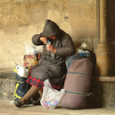
By Ann Marie Foley - 05 December, 2019

The latest government figures show that for the first time the number of people experiencing homelessness surpassed 10,500.
The news that there were 10,514 people in emergency homeless accommodation came as Minister for Housing, Planning and Local Government, Eoghan Murphy, faced a vote of no confidence in the Dáil.
The vote was defeated and the Minister defended the government’s housing policy as it emerged that in October 2019 there were 117 more people in homeless accommodation than in September this year.
On Newstalk Breakfast, Pat Doyle, CEO, Peter McVerry Trust, said changing the Minister in office is not the answer; rather, the answer lies in reducing the numbers of families that need emergency accommodation.
Minister Murphy said the increase “was expected following the introduction of new emergency beds in the Dublin region recently”. Commenting on the homeless and rough sleeper statistics, he said: “Rebuilding Ireland continues to put in place supports to help people out of homelessness.”
The Minister added that the latest quarterly reports show a continued increase in the number of exits from homelessness. “The number of people in emergency accommodation is unacceptably high and we must continue to implement every necessary support, whilst also driving the continuing increase in the supply of new homes,” he said.
However, opposition politicians and homeless charities stated that the government’s housing policy, Rebuilding Ireland, is not working. Wayne Stanley, National Spokesperson for the Simon Communities, said that the government must take action to ensure that the thousands facing into Christmas in homelessness are given hope.
“In November, two Oireachtas committees released reports calling for the levels of social and affordable housing to be increased to prevent instances of family homelessness,” he said. “At this stage, the government must seriously look at revising the targets for social housing included in the Rebuilding Ireland programme, and act to improve levels of availability of suitable and secure accommodation for those currently experiencing homelessness.”
He highlighted that the homeless, including 3,826 children, “are now trying to live in extremely stressful and trying circumstances, without a place to call home.”
These statistics do not capture the full scale of homelessness, as they omit rough sleepers, those in squats, people in direct provision and women’s shelters, and the “hidden homeless” who have no home of their own, he explained.
He welcomed the collaboration between NGOs, local authorities and government departments on the ground, the decline in family and child homelessness in October, and the drop in the number of rough sleepers. However, he said it is hard to claim these as successes in the context of ever growing numbers of people experiencing homelessness.
“As we face into Christmas, we must not allow ourselves to become immune to the continuing worsening of the housing and homelessness crisis. We need to remember that this homelessness and housing crisis is not a normal situation, and should not be seen as acceptable on any level,” he said.
The latest Department of Housing, Planning and Local Government statistics cover the men, women and children who were in emergency accommodation during the week of 21 to 27 October. Simon Communities pointed out that this is the fourth consecutive month in which the numbers have risen. When compared with a year ago, October 2018, the numbers of people in emergency accommodation saw an overall increase of 8.1 per cent.
The Department of Housing, Planning and Local Government highlighted that the monthly report for October 2019 shows that there were a total of 10,514 individuals in emergency accommodation, including 6,688 adults, 1,733 families and 3,826 dependants. This represents a decrease of 23 families, a decrease of 47 children and an overall increase of 117 on the numbers in emergency accommodation from the September report.
The Winter Rough Sleeper Count carried out on the night of 26 November into the morning of 27 November 2019 shows a 41 per cent decrease on the winter 2018 figure – a total of 92 persons confirmed as rough sleeping across the Dublin region in winter 2019 compared with 152 in 2018. This is the lowest figure for a winter rough sleeper count since 2015 and the lowest since Rebuilding Ireland began.